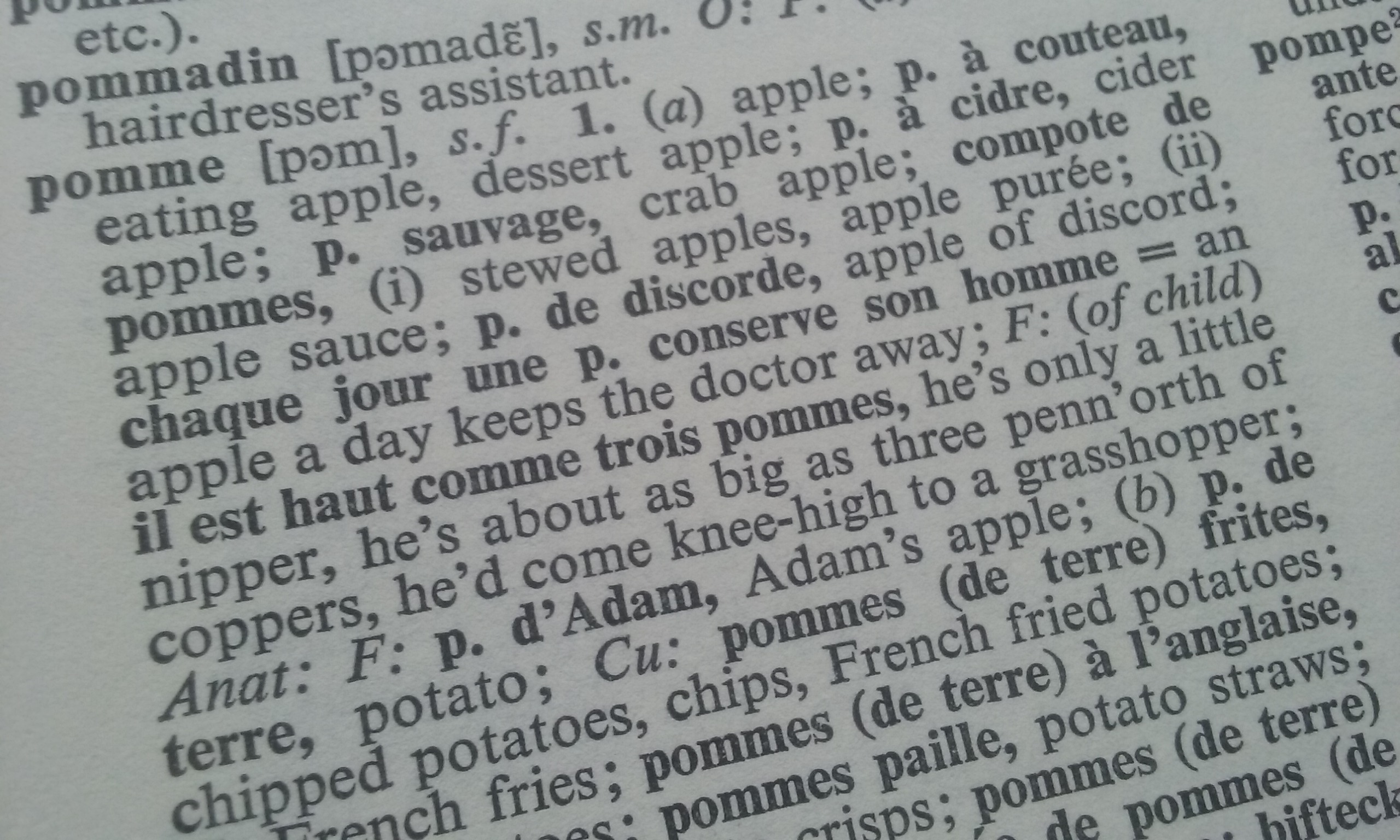Archive for the ‘Fiction’ Category
Two sausages don’t make a rasher
Looking at his plate, James shook his head disbelievingly. “This is not my breakfast, surely?” he said.
Mrs McGarrigle shook her head, and quietly informed him, that indeed it was.
James protested: “I always have my full Ulster Fry every morning. It’s what helps to keep me going through my hard slog at the University. You know that!”
“I know, and it was our agreement, but today, it simply cannot be done.”
—ooo—
The previous day, Mrs McGarrigle had done her usual round of messages: bread from the bakery, fruit and veg from the greengrocer, milk from the dairy. All was going well until she reached the butcher’s. There appeared to be a terrible commotion both inside and out.
Smyth the Butcher was standing in the middle of his shop surround by a baying crowd of customers. All were clamouring for their usual orders. But none was able to be served. The stock simply wasn’t there.
Smyth was standing still, unable to think, let alone talk amidst all the confusion. His usual unflappable self-control was letting him down today. He simply did not know what to do next.
Into the fray stepped the bold Mrs McGarrigle. Well respected, the landlady of the Purple Duck Inn knew all present and had a commanding voice from years clearing them out in the bar.
“Hold your whist, would ye’s all!” she said loudly.
The room hushed, wondering what was to come next.
“What’s all the clamour about Smyth?”
“I’ve no bacon,” replied the butcher, quietly.
“No bacon, you say? Whatever has happened?”
“It’s all to do with the Scouts up at the Big House. They’ve some sort of big jamboree on, and all the bacon throughout the county has been bought up. You know how they only eat bacon, or something…”
“Aye, I have heard that said, but what’s got everyone here clamouring for your neck?” asked Mrs McGarrigle.
“Well, like you, we’re all creatures of habit,” replied Mrs Nichols, “we always buy the same things. Our husbands, sons, and tenants, only known one breakfast—the full Ulster Fry. They need their bacon just as much as their sausage or potato bread.”
“I’ve plenty of sausages,” interjected Smyth the Butcher. “I’ll even let you all have them at half the price, if you’ll just leave me alone. It’s not my fault I’ve no bacon.”
—ooo—
Thus it was that the menfolk of the town all woke up this morning to the smell of sausages. Sausages frying everywhere. Nowhere was there any smell of bacon.
James continued to protest. But there was little to nothing he could do. All he could do was get on with eating his breakfast: six sausages and all.
“I like sausages, Mrs McGarrigle, you know I do. But two sausages don’t make a rasher.”
Note
Written in half-an-hour at The Inkslingers writing group in the Irish Writers Centre, Parnell Square, Dublin 1, on Saturday 13th August 2016.
Apples. Oh so many apples.
Elsie had taken a risk, but she knew she had to find a new supplier as Farmer Jones had just retired, his farm was being sold. The new owner was not going to be growing any fruit or vegetables. The fields of crops were going to be built on. A new village. But it is only up the road, so perhaps they will want to visit Elsie’s shop and buy themselves chips. Every cloud has a silver lining, she thought.
Just after Farmer Jones had left, she had sat down and wondered what she was going to do. She had to find a new supplier and quickly. She couldn’t be without the raw ingredients.
Turning to one of her trusted staff, she asked if they had any ideas. Paul had said that he could look online and see if he help her out. Perhaps find a good deal.
Elsie didn’t trust computers. Not one bit did she trust them. Her till was still in £-s-d even though the country had gone decimal well over forty years ago. Change was not something she liked at all.
But Paul was a great lad, he had come from the local secondary school on work experience, and in a way had never left. He was great at preparing the ingredients. He was fantastic with the customers. And he had created a brand new Internet site thingy for the shop. It did seem to be bringing in new customers.
So, letting Paul investigate new suppliers was just another job he could do, and let her get on with the frying of chips. That was the job she loved. Her Arthur had introduced her to it just before he left for the war. At over ninety years old, Elsie was well past her retirement, but what else was she going to do.
So it was that Paul had found a supplier who could supply the required quantity and in double quick time. He quickly got Elsie’s agreement, and within a couple of days, a lorry pulled up outside with the first delivery.
It was at that point, that Elsie started to worry… the lorry had pictures of apples on it, not of potatoes. What was going on? This did not seem quite right at all. The lorry had French number plates as well. Could Paul not have found a British supplier?
In came the bags, into the storeroom. The payment had been made up front, but she signed the driver’s docket and he was away. It was time to test the produce.
The first bag she opened had apples in it. As did the second and the third. By the tenth bag Elsie was crying. What was she going to do? How had this happened?
Paul arrived for his shift, and Elsie, having recovered some composure, but still quite upset, asked him, “When you were at school, what grade did you get in French?”
“I think it was a D, Elsie,” he replied. “Why do you ask?”
“Do you remember what the French word for potato is?” his employer asked him.
“ `Pomme’ I think,” he said quickly, beginning to doubt himself.
“Not exactly,” replied Elsie. “Look in my old dictionary here!” She showed Paul her old, rather battered French-English English-French dictionary. She had had since she was at school.

Pomme : Apple
Pomme de terre : Potato
“I didn’t… did I?” said Paul, beginning to think he knew why Elsie had been crying.
“Yes, you did,” replied Elsie… “So now what are we going to do?”
Paul sat down and had a think, then quickly said, “I’ll go down to the local cash and carry and buy enough potatoes to last us the week myself.”
“What about the apples? Oh so many apples?” asked Elsie.
“We will have an experiment. It might even work.”
So it was that from then on, Elsie’s chip shop had a sweet menu as well as savoury. Deep fried apple chips proved just as popular as the ordinary potato variety. And all because Paul thought outside the box and looked to Europe for a supplier for potatoes.
Notes
1. Header image is by “Chips Redux” by Hamburger Hepler, https://flic.kr/p/8cmCnc Used under Creative Commons Licence.
2. Dictionary image. Photo: John McFarland Campbell
Boots and laces
Sitting under the tree at the bottom of Slemish Mountain, Matthew suddenly felt very foolish. He was always well-prepared, for any eventuality, but today’s hike was just not going his way.
He had started well in the County Antrim countryside. His kit packed in his rucksack after his night in the open air. After a quick brew, he was off heading towards the volcanic plug that is Slemish.
On his way he passed through the small settlement of Buckna, he followed the roads and climbed towards the carpark at the base of the holy mountain.
As he passed the farmyard on the way up the lane, he felt something give way. His bootlace had broken on his right boot. He stopped, reached into his kit, and re-laced the boot. Once again he started up the lane.
The car park was not as he had remembered it, perhaps the local council had invested money in the facilities. He checked his kit and set off towards the tree. There he had felt the bootlace go in his left boot. This is where he suddenly had a problem.
During yesterday’s hike to Broughshane, the bootlace had gone in his left boot before. He had re-laced the boot. Today it had broken. There must be something wrong with the laces he thought. But that did not help him today.
Planning for this trip, he had packed his kit with one spare pair of laces. He had never needed them before, so he was sure he would be fine. His boots were coming to the end of their useful life but he had a spare pair at the bottom of the bag—just in case. Being the thrifty fellow he was, he had the boots but would transfer the laces from one pair to another as and when he needed.
None of this thriftiness helped today, though. Sitting exposed on the volcanic plug, Matthew had a problem.
—ooo—
Siobhán looked out from the Trig Point on the summit of the old volcano. She had been coming here since she was a girl. Today, she had climbed on her own. She’d never done that before.
She climbed the mountain with just herself, and a small daypack with some essentials in it: a flask, an apple or two, a map, her camera and tripod.
Like so many people, she had photographs of the mountain, but not from the mountain. That was her objective on this occasion. The mist around made there not too much of a view of the town in the distance, but she looked across at Buckna and found a view she thought she could take.
She stepped back, to sort out the tripod, and tripped. She heard a rip, and looked down… Her shoes had come apart. She looked at her feet and wondered what to do.
Deciding that she wanted what she came up the mountain for, she got back on her feet, took the photograph. She then sat down, examined the shoes, and decided to get off the mountain as quickly as possible. She thought she had a spare pair of bootlaces in her car, she may even have two. She could find a way of tying the shoes together, provided there was no further damage during the descent.
As she reached the tree, Siobhán saw a man just sitting underneath it.
“It’s a great day to be up here,” she said, as one climber to another.
“Yes, lovely and quiet, few people about,” he replied. He quickly looked away, and back into his mug of tea.
“Are you OK?” asked Siobhán.
“I am. But your shoes are not,” he quickly replied.
Siobhán was surprised he had even noticed, he had not been looking at her for very long at all. He couldn’t have seen her shoes had fallen apart. Could he?
“Well, yes, I had a bit of an accident with my boots.”
“That makes two of us,” Matthew said.
“Why? What has happened you? You look well prepared.”
“I am. Or rather I thought I was. You see, I hike in the hills every year for my holiday. I’ve never had a bootlace break on me at all, but my left one went yesterday, and the right as I climbed to the carpark. And then as I got to this tree, the left one went again.”
“And your spare set is used?”
“That’s it in a nutshell. I’m stuck sat here wondering how to get my boots done up again. But I have got a bit of a solution for you,” he said.
Siobhán wondered what he could mean. Matthew reached into his bag and produced his other pair of boots. They look like they ought to fit you — and yours have fallen apart. At least let me help you with these.
At that moment, Siobhán just laughed. Matthew looked at her, puzzled. What was so funny.
“You have two pairs of boots but no bootlaces, and in my car, I have two pairs of bootlaces but no boots. Looks like we were meant to meet,” she replied.
The Crowned Lion
Tony hung around the station entrance all day, every day. With nowhere else to go, he hoped that he would catch the eye of one of the men who passed on their way to their jobs in the city.
His life had not always been this way. He had had many friends and many colleagues. He had been the life and soul of every party, but now, he was just another down-and-out hanging around the station.
Scanning every lapel, and every tie, of every man that passed him, was not an easy task, but he had scanned worse terrain. He was experienced in finding his man.
Throughout his life, he had enjoyed being outdoors. As a boy, he had camped with the other boys in his Scout Patrol after a day’s hike in the forests near his home.
Greenery and foliage gave way to sand and wasteland of the Middle Eastern deserts by the time he made it to his late teens. He was still a Patrol Leader but the patrol was of soldiers, not of Scouts.
Spotting the opportunities and taking them was always important. Today, the opportunity he was looking for arose.
From afar, he thought it was just an illusion, it was wishful thinking, but no, today it was real.
oo—oo—oo
Angus O’Keeffe jumped off his train and started towards his job in the financial district. He stopped at the newspaper stand and bought his usual paper, The Times. He saw the usuals at the station entrance, the beggars, the hangers-on, the people with nowhere to go.
He made a couple of decisions that day that influenced what happened. The first was that he decided against wearing the red poppy he had bought earlier in the week as it can still raise tensions in the Irish capital. Instead, he wore his badge with a crowned lion.
The second decision was realising that the change from his newspaper would allow him to buy two coffees not just his usual one.
The second coffee was given to the man standing outside the entrance. He looked like he could do with a something to warm him up, this cold November morning.
“Thanks for the coffee, Sir,” said the man.
“No problem, you looked like you could do with it,” replied Angus.
“Yes, Sir. It’s been a cold night.”
“Have you been outside all night?”
He nodded.
Angus decided he could be late for his job. No one would mind him being late. After all, he was the boss. This man needed to talk. Today, of all days, he could hardly not try to do his best for his fellow man.
oo—oo—oo
That day was the turning point for Tony. Angus had bought him a coffee, and took the time to speak to him, he didn’t look down on him, he simply listened.
Tony decided he could trust Angus. The whole of Tony’s story came tumbling out. How after he left his regiment he had nowhere to call home. He had no job to turn to, he only knew one thing: how to be a leader of men.
Without examination results and experience in civilian life, he had found it difficult to find a job. With no job, he had no money to bolster his army pension. He ended up living on the streets.
He was sure that there were people he could turn to, but here in Dublin , finding someone he could trust with his story. Someone who could understand his service in the Irish Guards was not so easy.
Today, it was easy. Today, on the lapel of the man who gave him a coffee he had seen the Crowned Lion. He knew that meant he could trust him. He knew that Angus could find help for him.
Together, Angus and Tony made their way to the office of the Royal British Legion.
By the end of the day, Tony had somewhere to stay that was indoors. And Angus was searching for opportunities in his company for a leader of men.
The Crowned Lion had worked its magic once more.

A balding man secretly loves his barber
Every two weeks they met. Every two weeks they looked into each other’s eyes. They had been doing this for years and years.
When Gareth had first met Harry, he had been a student in the local seminary. They had been handed a book on etiquette.1 which recommended that seminarians should get their hair cut at regular intervals. So he had asked one of the lecturers where could be recommended, and ultimately he had met Harry.
All those years ago, Harry had not made it to actually cutting hair. Back then, he looked after sweeping the floor, welcoming men to the shop, and making sure the barbers had all the requisites for their trade.
Gareth first came to the shop with a couple of other students. The age-old “always in threes, never in twos” applied as much in the diocesan seminary as in the monastery.
The rough-and-ready atmosphere in the barber’s shop was a polar opposite from the family-life of Gareth’s colleagues. They found it hard to speak to the other men there. Not following the local football team (or any at all) there was little common ground.
Now, don’t get me wrong, Gareth didn’t follow the football either, but he did have a passion for music. Having a passion for anything helped here: that and having the gift of the gab.
Over the first year, the other two seminarians drifted away from their regular short back and sides, and eventually it was only Gareth who came back fortnight by fortnight.
Over that same year, Harry progressed from chief dogsbody to apprentice barber. No longer did he have to run around after others: there was a new dogsbody now. Harry was starting to learn his trade.
The two young men, met like this fortnight by fortnight, month by month, year by year until the week before Gareth’s ordination. Harry knew that the seminarians would study for seven years and then be gone. He didn’t expect Gareth to be any different. He had seen other more senior students leave: never to be seen again.
So when Harry asked Gareth what he was going to be doing in a few months’ time, he was surprised to hear that he was being sent to the adjacent parish. Gareth was pleased he could come back and get his hair seen to in his usual haunt.
And so it continued, the young men grew into slightly older men: growing up both in themselves and in their chosen vocations. Fr Gareth was moved about the diocese quite a lot by his bishop to gain new experiences, but he always came back to the same place for his regular appointment. And Harry was always there.
Roll on more years, Fr Gareth was appointed as a lecturer at the seminary itself. Nowadays, the students didn’t care for etiquette, nor for hair lengths as he had been told he needed, but for any particular student interested he would recommend the local barber’s shop.
By now, the shop itself was called “Harry’s” as the original owner had died. Fr Gareth was there the day that happened and was able to administer the last rites. After the funeral, Harry and Gareth had sat talking about what would happen now. A man came and talked to them both, thanked Fr Gareth for all he had done: arranging the funeral, sorting the grave, and then turned to Harry and gave him a letter.
The letter told that the old man had had no family. The closest thing he had was Harry who he had taken on as an apprentice about twenty years ago. He had left his whole estate to Harry as he had shown so much promise, attention to detail, and was much in demand as a barber. The two of them sat there stunned.
—
Fr Gareth turned, and said “I’ll see you next week then, Harry.”
Harry replied, “Aye, you will, but do you really need to come in at all?”
“Of course I do, every two weeks, you know me.”
“Regular as clockwork you are.”
—
Harry was sure that his old friend knew he didn’t have the hair anymore that needed cut. His friend was practically bald. But they enjoyed having a coffee at the end, and sitting talking, putting the world to rights.
Fr Gareth kept coming in, every two weeks. He knew that Harry had to work to try and find hairs to cut, but he loved the touch of the life-long friend. It was the closest he would ever come to a mate.
The touch from Harry as he cut his hair was the most sensual touch he had ever had. Secretly, he was in love with his barber. He had always been so, but he could do nothing about it.
Nothing, except come back every two weeks.
Notes
1. Social Manual for Seminarians was written by Reverend Thomas F. Casey and Reverend Leo C. Gainor, O.P. with a foreword by Richard Cardinal Cushing.
2. This fiction was written in half-an-hour where the writing prompt was the title.













